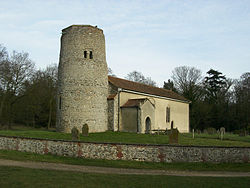East Lexham
| East Lexham | |
|---|---|
 Saint Andrew parish church, East Lexham, Norfolk |
|
| East Lexham shown within Norfolk | |
| OS grid reference | TF840120 |
| • London | 106 miles (171 km) |
| Civil parish | |
| District | |
| Shire county | |
| Region | |
| Country | England |
| Sovereign state | United Kingdom |
| Post town | KING'S LYNN |
| Postcode district | PE32 |
| Dialling code | 01328 |
| Police | Norfolk |
| Fire | Norfolk |
| Ambulance | East of England |
| EU Parliament | East of England |
East Lexham is a village in the English county of Norfolk. It is 7.7 miles (12.4 km) north of the town of Swaffham, 30.1 miles (48.4 km) west north west of Norwich and 106 miles (171 km) north east of London.
The village forms part of the civil parish of Lexham, which in turn is part of the district of Breckland. Local government responsibilities are shared between the parish, district and county councils. The population of the village is included in the civil parish of Sporle with Palgrave.
The village is notable for its Anglican parish church. Dedicated to Saint Andrew, it is one of 124 existing round-tower churches in Norfolk.
The village lies about 1.5 miles (2.4 km) east of the A1065 Mildenhall to Fakenham road. The nearest railway station is at King’s Lynn for the Fen Line which runs between King’s Lynn and Cambridge. The nearest airport is Norwich International Airport.
The parish church of Saint Andrews is a very early church which is thought to date from circa 900 AD and is thought to be one of the oldest churches in England. Nikolaus Pevsner, in his book North-west and South Norfolk but the church as probably Anglo-Saxon. the church stands within a circular churchyard with the building on a slight mound which suggest that this could have been a site for pagan worship, later taken over by the Christians in the 7C to curtail pagan worship. The original church may well have been built of wood or wattle and daub. The most recent research has also suggested, like Pevsner, that the current church was built by Saxons but with a Norman influence. This conclusion has been made due to the style and design of the three belfry openings which have all been constructed differently. The east opening has a unique stone frame cut out to form a maltese cross. Within the belfry is one bell which has a Latin inscription which translates to I am called the bell of Virgin exalted Mary, The bell is thought to have been cast by Brasyers of Norwich in the 15th century.
...
Wikipedia

